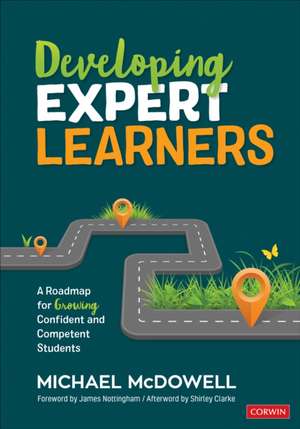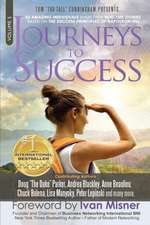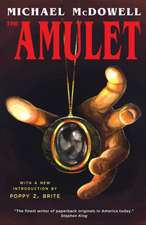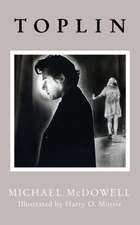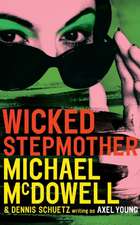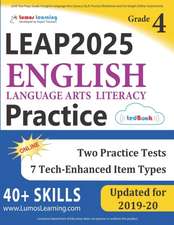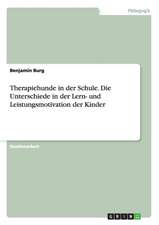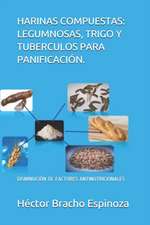Developing Expert Learners: A Roadmap for Growing Confident and Competent Students: Corwin Teaching Essentials
Autor Michael McDowellen Limba Engleză Paperback – 23 apr 2019
Din seria Corwin Teaching Essentials
-
 Preț: 197.23 lei
Preț: 197.23 lei -
 Preț: 282.10 lei
Preț: 282.10 lei -
 Preț: 247.31 lei
Preț: 247.31 lei -
 Preț: 278.92 lei
Preț: 278.92 lei -
 Preț: 245.89 lei
Preț: 245.89 lei -
 Preț: 229.20 lei
Preț: 229.20 lei -
 Preț: 281.38 lei
Preț: 281.38 lei -
 Preț: 216.12 lei
Preț: 216.12 lei -
 Preț: 195.85 lei
Preț: 195.85 lei -
 Preț: 165.86 lei
Preț: 165.86 lei -
 Preț: 280.37 lei
Preț: 280.37 lei -
 Preț: 269.07 lei
Preț: 269.07 lei -
 Preț: 290.65 lei
Preț: 290.65 lei -
 Preț: 154.25 lei
Preț: 154.25 lei -
 Preț: 275.92 lei
Preț: 275.92 lei -
 Preț: 196.64 lei
Preț: 196.64 lei -
 Preț: 191.99 lei
Preț: 191.99 lei -
 Preț: 228.05 lei
Preț: 228.05 lei -
 Preț: 274.24 lei
Preț: 274.24 lei -
 Preț: 152.25 lei
Preț: 152.25 lei -
 Preț: 188.51 lei
Preț: 188.51 lei -
 Preț: 278.10 lei
Preț: 278.10 lei -
 Preț: 288.05 lei
Preț: 288.05 lei -
 Preț: 239.30 lei
Preț: 239.30 lei -
 Preț: 191.99 lei
Preț: 191.99 lei -
 Preț: 272.03 lei
Preț: 272.03 lei -
 Preț: 185.60 lei
Preț: 185.60 lei -
 Preț: 175.41 lei
Preț: 175.41 lei -
 Preț: 192.18 lei
Preț: 192.18 lei -
 Preț: 270.70 lei
Preț: 270.70 lei -
 Preț: 271.26 lei
Preț: 271.26 lei -
 Preț: 276.90 lei
Preț: 276.90 lei -
![Answers to Your Biggest Questions About Creating a Dynamic Classroom: Five to Thrive [series]](https://i3.books-express.ro/bs/9781071856789/answers-to-your-biggest-questions-about-creating-a-dynamic-classroom.jpg) Preț: 235.32 lei
Preț: 235.32 lei -
 Preț: 269.35 lei
Preț: 269.35 lei -
 Preț: 85.05 lei
Preț: 85.05 lei -
 Preț: 191.94 lei
Preț: 191.94 lei -
 Preț: 269.35 lei
Preț: 269.35 lei -
 Preț: 191.99 lei
Preț: 191.99 lei -
 Preț: 185.60 lei
Preț: 185.60 lei -
 Preț: 268.25 lei
Preț: 268.25 lei -
 Preț: 246.82 lei
Preț: 246.82 lei -
 Preț: 284.12 lei
Preț: 284.12 lei -
 Preț: 196.17 lei
Preț: 196.17 lei -
 Preț: 246.00 lei
Preț: 246.00 lei -
 Preț: 276.19 lei
Preț: 276.19 lei -
 Preț: 278.61 lei
Preț: 278.61 lei -
 Preț: 277.83 lei
Preț: 277.83 lei -
 Preț: 277.01 lei
Preț: 277.01 lei
Preț: 278.92 lei
Nou
Puncte Express: 418
Preț estimativ în valută:
53.37€ • 55.87$ • 44.16£
53.37€ • 55.87$ • 44.16£
Carte disponibilă
Livrare economică 17-31 martie
Livrare express 28 februarie-06 martie pentru 34.90 lei
Preluare comenzi: 021 569.72.76
Specificații
ISBN-13: 9781544337159
ISBN-10: 1544337159
Pagini: 280
Dimensiuni: 178 x 254 x 16 mm
Greutate: 0.57 kg
Ediția:1
Editura: SAGE Publications
Colecția Corwin
Seria Corwin Teaching Essentials
Locul publicării:Thousand Oaks, United States
ISBN-10: 1544337159
Pagini: 280
Dimensiuni: 178 x 254 x 16 mm
Greutate: 0.57 kg
Ediția:1
Editura: SAGE Publications
Colecția Corwin
Seria Corwin Teaching Essentials
Locul publicării:Thousand Oaks, United States
Recenzii
"Teaching for transfer" - imparting knowledge and skill in a way that makes them really useful, and not just fodder for exams and tests - is the Holy Grail of education. This book is a wonderfully practical guide to how to do it in any classroom.
As educators, we are challenged in preparing our students for college and career readiness as they go into the real world. Developing Student Expertise addresses the intentional moves of the teacher to prepare students for challenging work at their level of learning, resulting in students reaching their fullest potential as expertise in their own learning.
This book is the roadmap to take students from being developing experts to the experts they all have the potential to be. Providing high expectations and valuing all students as learners requires educators to plan instruction that takes students—all students—from their current level, to that place just beyond that level. McDowell suggests that in order for students to become experts, “the control over learning must be mutually shared between teachers and students.” Teaching students how to build their efficacy in learning, the ability to navigate and lead their own learning, is the optimal approach for every faculty to engage in. McDowell identifies The 5Cs (Clarify, Challenge, Check, Communicate, and Cross contexts) that are requisite for this shared partnership to flourish, and gives reflection questions and activities that allow every educator to plan their steps toward this desirable result.
As he did in Rigorous PBL by Design, Michael McDowell has once again produced an invaluable resource for educators who are striving to empower students to fully develop their own expertise and self-efficacy. Developing Expert Learners provides the practical means—through planning tools, research-based strategies, teaching practices, and special features—to enable teachers to maximize student learning at the surface, deep, and transfer levels of complexity. By integrating “The 5Cs (Clarify, Challenge, Check, Communicate, and Cross Contexts) as guiding actions for developing student expertise” into all unit and lesson planning, McDowell shows how these strategies can dramatically impact student learning. Classroom educators will find Chapter 3, “Planning for Impact,” and Chapter 4, “Teaching for Impact” particularly useful for creating and implementing their own roadmap to greater student self-efficacy. Chapter 5, “Collective Efficacy,” presents a powerful framework that teacher teams can utilize to create their own beliefs and action steps to greater student learning.
I appreciate and am enthusiastic about the layout of this book. For a coach, team leader, or school administrator, the book lends itself to being a manual for school improvement. It provides excellent questions to reflect on and activities after each chapter for school leaders to collaborate with and work alongside teacher teams in developing efficacy and expertise at their schools—which in the end will impact the achievement of all our learners. Our district will benefit from the content of this book and its resources, activities, and reflection questions to increase student learning at the surface, deep, and transfer levels through the work of teams.
This urgently needed book has the potential to transform schools and experiences for learners and teachers everywhere. Once again, Michael McDowell has written a compelling, practical guide for educators who seek to give their students the skills they need to be successful in our ever-changing world. This book is a must-read for new and veteran educators alike!
Of course, Michael McDowell has once again provided a purposeful and practical guide for teachers and leaders. Teachers, administrators, and even student leaders recognize the importance of focusing on learning through clear learning intentions, success criteria, and now—with this new book—tools and strategies to measure student progress. We have made a fundamental shift in how we address instructional practice, review student work, and more important, build our own efficacy and expertise at all levels of our organization.
In Developing Expert Learners, McDowell harnesses the research on building student self-efficacy, peer-to-peer feedback structures, and student ownership of learning through a handful of focus areas, aligned and actionable learning practices, and tools that have been road-tested. If you wish to build stronger, more invested, and more equipped learners, this book is a must-read.
As a follow up to Rigorous PBL by Design, McDowell continues to write about practical strategies to help teachers build students’ expertise. The book is filled with strategies, tools, and very useful references based on the exciting research of John Hattie and Visible Learning. McDowell shapes this book around 5Cs—promoting clarity, leveraging challenge, consistent checking, cultivating conversation, and tackling contextually rich problems. Michael’s command of lesson design and instruction make this a natural follow up to his very successful Rigorous PBL by Design. It will clearly help teachers have impact on student learning.
As we move away from the age of pouring knowledge into the brains of learners and, instead, begin handing them the steering wheel of their own learning to develop efficacy and expertise, McDowell's tool kit of sound simplicity, sparked by wisdom and courage, offers clear and do-able courses of action that all educators can put into motion to change the learning lives of their students.
Developing Expert Learners is a practitioner guide for the research-based classroom teacher. McDowell does an exemplary job of providing powerful strategies that can transform any classroom into a learning laboratory.
The book is filled with these strategies, relevant school-based examples, and educator testimonials that inspire. McDowell focuses on the importance of both the learner and the teacher in helping to co-construct a learning community that empowers learners to attain high levels of expertise and efficacy. The book is a wonderful balance between theory and practice and a must have for any educator trying to move their students from surface to deep understanding. McDowell brings action to research.
Michael McDowell provides practical examples in designing learning for students. Developing Expert Learners is a must-read for educators to build student expertise in a meaningful way, with many wonderful thoughts and ideas to support teachers in developing clarity for their students.
As educators, we are challenged in preparing our students for college and career readiness as they go into the real world. Developing Student Expertise addresses the intentional moves of the teacher to prepare students for challenging work at their level of learning, resulting in students reaching their fullest potential as expertise in their own learning.
This book is the roadmap to take students from being developing experts to the experts they all have the potential to be. Providing high expectations and valuing all students as learners requires educators to plan instruction that takes students—all students—from their current level, to that place just beyond that level. McDowell suggests that in order for students to become experts, “the control over learning must be mutually shared between teachers and students.” Teaching students how to build their efficacy in learning, the ability to navigate and lead their own learning, is the optimal approach for every faculty to engage in. McDowell identifies The 5Cs (Clarify, Challenge, Check, Communicate, and Cross contexts) that are requisite for this shared partnership to flourish, and gives reflection questions and activities that allow every educator to plan their steps toward this desirable result.
As he did in Rigorous PBL by Design, Michael McDowell has once again produced an invaluable resource for educators who are striving to empower students to fully develop their own expertise and self-efficacy. Developing Expert Learners provides the practical means—through planning tools, research-based strategies, teaching practices, and special features—to enable teachers to maximize student learning at the surface, deep, and transfer levels of complexity. By integrating “The 5Cs (Clarify, Challenge, Check, Communicate, and Cross Contexts) as guiding actions for developing student expertise” into all unit and lesson planning, McDowell shows how these strategies can dramatically impact student learning. Classroom educators will find Chapter 3, “Planning for Impact,” and Chapter 4, “Teaching for Impact” particularly useful for creating and implementing their own roadmap to greater student self-efficacy. Chapter 5, “Collective Efficacy,” presents a powerful framework that teacher teams can utilize to create their own beliefs and action steps to greater student learning.
I appreciate and am enthusiastic about the layout of this book. For a coach, team leader, or school administrator, the book lends itself to being a manual for school improvement. It provides excellent questions to reflect on and activities after each chapter for school leaders to collaborate with and work alongside teacher teams in developing efficacy and expertise at their schools—which in the end will impact the achievement of all our learners. Our district will benefit from the content of this book and its resources, activities, and reflection questions to increase student learning at the surface, deep, and transfer levels through the work of teams.
This urgently needed book has the potential to transform schools and experiences for learners and teachers everywhere. Once again, Michael McDowell has written a compelling, practical guide for educators who seek to give their students the skills they need to be successful in our ever-changing world. This book is a must-read for new and veteran educators alike!
Of course, Michael McDowell has once again provided a purposeful and practical guide for teachers and leaders. Teachers, administrators, and even student leaders recognize the importance of focusing on learning through clear learning intentions, success criteria, and now—with this new book—tools and strategies to measure student progress. We have made a fundamental shift in how we address instructional practice, review student work, and more important, build our own efficacy and expertise at all levels of our organization.
In Developing Expert Learners, McDowell harnesses the research on building student self-efficacy, peer-to-peer feedback structures, and student ownership of learning through a handful of focus areas, aligned and actionable learning practices, and tools that have been road-tested. If you wish to build stronger, more invested, and more equipped learners, this book is a must-read.
As a follow up to Rigorous PBL by Design, McDowell continues to write about practical strategies to help teachers build students’ expertise. The book is filled with strategies, tools, and very useful references based on the exciting research of John Hattie and Visible Learning. McDowell shapes this book around 5Cs—promoting clarity, leveraging challenge, consistent checking, cultivating conversation, and tackling contextually rich problems. Michael’s command of lesson design and instruction make this a natural follow up to his very successful Rigorous PBL by Design. It will clearly help teachers have impact on student learning.
As we move away from the age of pouring knowledge into the brains of learners and, instead, begin handing them the steering wheel of their own learning to develop efficacy and expertise, McDowell's tool kit of sound simplicity, sparked by wisdom and courage, offers clear and do-able courses of action that all educators can put into motion to change the learning lives of their students.
Developing Expert Learners is a practitioner guide for the research-based classroom teacher. McDowell does an exemplary job of providing powerful strategies that can transform any classroom into a learning laboratory.
The book is filled with these strategies, relevant school-based examples, and educator testimonials that inspire. McDowell focuses on the importance of both the learner and the teacher in helping to co-construct a learning community that empowers learners to attain high levels of expertise and efficacy. The book is a wonderful balance between theory and practice and a must have for any educator trying to move their students from surface to deep understanding. McDowell brings action to research.
Michael McDowell provides practical examples in designing learning for students. Developing Expert Learners is a must-read for educators to build student expertise in a meaningful way, with many wonderful thoughts and ideas to support teachers in developing clarity for their students.
Cuprins
List of Online Resources
Foreword
Acknowledgments
About the Author
A Teacher’s Perspective
Introduction
Chapter 1. Guiding Actions for Expertise and Efficacy
The 5Cs: Guiding Actions for Developing Student Expertise
Putting Principles of Expertise Into Practice Successfully
Conclusion
Chapter 2. Conditions for Impact: Creating a Culture of Collective Efficacy
Culture of Learning
Recurring Problems
Defining Efficacy
Evidence of Efficacy
Teaching Strategies for Developing Student Efficacy
Conclusion
Chapter 3. Planning for Impact
Focused Design
Unit Planning: Five Design Steps
Planning Process
Conclusion
Chapter 4. Teaching for Impact
Illuminating the Hidden Understandings of Learners
Establishing Routines
Expertise-Based Strategies
Sequencing Developing Expertise Routines
Conclusion
Chapter 5. Collective Efficacy: Developing Efficacy and Expertise as Professionals
Linking Professional and Student Efficacy
Designing Core Tasks for Professionals to Impact Learning
Creating a Process for Collective Learning Through Teaming
Structuring the Methods for Determining, Discussing, Debating, and Designing Next Steps for Improvement
Conclusion
Conclusion
Afterword
Resources
Conditions for Impact Resources
Planning for Impact Resources
Teaching for Impact Resources
Collective Efficacy: Developing Efficacy and Expertise as Professionals
References
Index
Foreword
Acknowledgments
About the Author
A Teacher’s Perspective
Introduction
Chapter 1. Guiding Actions for Expertise and Efficacy
The 5Cs: Guiding Actions for Developing Student Expertise
Putting Principles of Expertise Into Practice Successfully
Conclusion
Chapter 2. Conditions for Impact: Creating a Culture of Collective Efficacy
Culture of Learning
Recurring Problems
Defining Efficacy
Evidence of Efficacy
Teaching Strategies for Developing Student Efficacy
Conclusion
Chapter 3. Planning for Impact
Focused Design
Unit Planning: Five Design Steps
Planning Process
Conclusion
Chapter 4. Teaching for Impact
Illuminating the Hidden Understandings of Learners
Establishing Routines
Expertise-Based Strategies
Sequencing Developing Expertise Routines
Conclusion
Chapter 5. Collective Efficacy: Developing Efficacy and Expertise as Professionals
Linking Professional and Student Efficacy
Designing Core Tasks for Professionals to Impact Learning
Creating a Process for Collective Learning Through Teaming
Structuring the Methods for Determining, Discussing, Debating, and Designing Next Steps for Improvement
Conclusion
Conclusion
Afterword
Resources
Conditions for Impact Resources
Planning for Impact Resources
Teaching for Impact Resources
Collective Efficacy: Developing Efficacy and Expertise as Professionals
References
Index
Notă biografică
Michael McDowell, EdD was a public school educator for eighteen years serving in the roles of classroom teacher, academic and athletic coach, school principal, assistant superintendent of personnel and instruction, and superintendent. During his tenure as a superintendent, his school district received state and national accolades including the National Blue Ribbon Award which recognized their work for student performance and mental health and well-being in the midst of the COVID-19 pandemic by the U.S. Department of Education.
Dr. McDowell serves on numerous boards, served as a college professor, and worked for non-profit organizations to enhance student learning around the world. Over the course of his career, Dr. McDowell has authored bestselling books, created professional learning programs and workbooks, provided keynotes and workshops, and provided practical tools and resources for thousands of teachers and leaders on almost every continent around the world. A prolific author and consultant, Dr. McDowell is recognized as one of the leading authorities on integrating innovative and impactful practices into schools. Offering keynotes and executive coaching to heads of school around the world, he partners with educational leaders to implement high leverage strategies that will enhance teaching and learning in classrooms, schools, and systems.
Dr. McDowell serves on numerous boards, served as a college professor, and worked for non-profit organizations to enhance student learning around the world. Over the course of his career, Dr. McDowell has authored bestselling books, created professional learning programs and workbooks, provided keynotes and workshops, and provided practical tools and resources for thousands of teachers and leaders on almost every continent around the world. A prolific author and consultant, Dr. McDowell is recognized as one of the leading authorities on integrating innovative and impactful practices into schools. Offering keynotes and executive coaching to heads of school around the world, he partners with educational leaders to implement high leverage strategies that will enhance teaching and learning in classrooms, schools, and systems.
Descriere
Building upon the groundwork from Rigorous PBL by Design, this resource provides practices that strategically support students as they move from novices to experts in core academics. This book
- Provides an actionable framework for developing student expertise
- Offers practical guidance for creating a culture that cultivates expertise and builds student efficacy
- Gives a unit and lesson template that clarifies the steps students must take to build, deepen, and apply core content knowledge and skills
- Ensures your students’ progress in their learning through a process for selecting instructional, feedback, and learning strategies
- Includes strategies for improving your professional expertise individually and collectively
